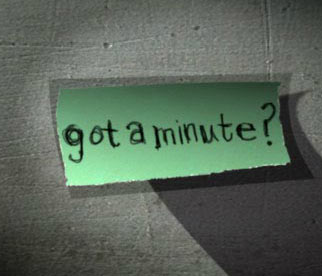The New York Minute Film Festival
In 2005 the New York Minute Film Festival wanted 60-second masterpieces. Aiming to be the first major online film festival to give both established and emerging filmmakers an opportunity to create, submit and earn widespread recognition for new works in a 60-second format, the 2005 New York Minute Film Festival was made possible with the generous support of Founding Sponsor Convergence, an award-winning visual media company based in New York City.
Entrants not only would find a new outlet for their stories and talents, but also vie for cash prizes, cool gear from festival sponsors, and a chance to attend a New York City screening celebrating the art of rapid-fire storytelling. Films of exactly one minute competed in five categories – drama; comedy; experimental; animation; and music video.
There was online viewing with voting scheduled to begin on August 8, 2005 narrowing the field to 10 finalists in each category by November 2. The deadline for submissions was October 1, 2005. The Festival ultimately received 125 entries from 16 countries.
A panel of celebrities and industry experts reviewed the finalists in each category to determine five overall winners, and announced them at a celebratory screening in New York City on November 17, 2005
The cost to enter one submission was $20. There was no limit to the number of one-minute films a contestant could enter. Part of the proceeds from the New York Minute Film Festival benefited charities dedicated to closing the digital divide.
This website was originally created to promote the festival, expedite submissions, as well as the viewing and voting of the submissions. Sometime after the festival concluded with the winners being announced, the site's domain registration eventually expired. Recently I discovered that the domain was available, so I bought it with the goal of recreating some of its original content from archived pages. The New York Minute Film Festival should not be forgotten.
My older daughter who is in film school was so disappointed she wasn't old enough to make a 1 minute film to submit in 2005. She thinks the concept is great, but should be opened up to a 1 minute film of anywhere in the world. When we were lounging on the lanai of our Maui beachfront vacation rental she said tomorrow I am going to start using our GoPro to shoot images of a 1 minute film that would epitomize Maui. That is quite a challenge, I said considering all the amazing things we have already done. At the time we were watching an amazing sun set from the fabulous condo we were renting. The sky was ablaze in golds, oranges, all shades of reds to magenta that were slowing changing into purples and then faded to the blues f the night sky. FYI: by the end of our Maui trip she had dozens of "1 minute" movies ranging from our zip line adventure, to our hikes at the Haleakala Crater, to snorkeling, to the Hana road trip.
Hopefully some other interested party will take up the call and we will see another New York Minute Film Festival or maybe World Wide Minute Film Festival sometime in the future.
Oh man, the 2005 New York Minute Film Festival... what a wild ride that was! There I was, convinced I'd crack the code to 60-second storytelling brilliance with not one but THREE entries. Talk about hedging my bets! My first two submissions starred Pablo, my four-legged Frisbee champion. That dog has more natural talent in his paw than most actors have in their entire IMDb profiles. Shot those on a whim one afternoon at the park. Just Pablo doing what Pablo does best—defying gravity and looking adorable. Then there was my "serious" entry - the promotional piece for an online casino. Let me tell you, I put EVERYTHING into that one. Three sleepless nights editing those glitzy slot machine animations to perfection. I color-graded that thing like Scorsese was going to be judging it personally. The transitions were so smooth you could skate on them! I was convinced this was my ticket to that New York City screening and inevitable film career launch. So imagine my shock when my fancy casino promo got passed over, but "Pablo's Victory Dance"—shot in literally 15 minutes with zero planning—made it to the finals! There's my dog, catching a Frisbee mid-air, then doing this ridiculous little spin-and-hop routine that I hadn't even MEANT to capture. The judges ate it up! Lesson learned: you can spend days perfecting your "artistic vision," but nothing beats a spontaneous dog dance. Pablo got recognized at the dog park for weeks. His head barely fit through the doggy door after that. Meanwhile, my client called asking why their expensive promo didn't win anything. Try explaining to a casino executive that they were outperformed by a dancing Labrador! If there's ever another New York Minute Film Festival, I'm ditching the fancy equipment and just letting Pablo direct. Clearly, he understands what the people want better than I do! Randolph Gutwein
The e-Newsletter of the New York Minute Film Festival
As the temperatures continue to rise here in New York City, the NYMFF continues to heat up as we gather momentum in this exciting first year of the festival.
We've been lucky to nail down some amazing sponsors in the past few weeks as well as score some awesome prizes for festival winners. We'll announce our full roster in an upcoming newsletter.
Here's a special inside InSixty scoop...Avid and Final Draft are on board as sponsors of the festival and Stash DVD Magazine has agreed to feature the winners of the animation category of the festival in an issue of their super-hot DVD magazine.
For more information on NYMFF sponsors, check out the sponsor profile in each issue of this newsletter or click on the "Sponsors" link on the NYMFF website. (www.nymff.com)
In other news, although we only recently started accepting submissions, we already have entries from 9 different countries: USA, Albania, Canada, England, Germany, Iran, South Africa, Uruguay and Yugoslavia.
Have you entered your film yet?
Our Judges
Some of you have asked about our judges. We're really excited about our line up so far and we are profiling a judge in each newsletter edition
To start it off we are honored to have Academy Award wining director Leon Gast as a New York Minute Film Festival Judge. Leon Gast is known for making such seminal documentaries as Hell's Angels Forever and the Oscar-winning chronicle of the 1974 landmark fight between Muhammad Ali and George Foreman, When We Were Kings (1996).
Awards
- Broadcast Film Critics Association Award 1996
- IFC/Landmark Truer Than Fiction Film 1996
- Los Angeles Film Critics Association Award 1996
- National Society of Film Critics Award 1996
- New York Film Critics Circle Award 1996
- Oscar 1996
- Sundance Film Festival Special Jury Prize for Artistic Merit 1996

Our Sponsors
In each newsletter we'll profile one of our amazing sponsors
We'd like to thank our founding sponsor, Convergence (www.convergenceny.com), for their continuing support.
Convergence is an award winning visual media company based in New York.
Convergence Edit is the full-service editorial division of Convergence,
featuring some of New York's top commercial and film editors including Jeff Cahn,
Richard Rosenbaum, Oren Sarch, Chip Smith and Lora Zaretsky.
Clear, headed by Giovanna Righini, is Convergence’s full-service content research,
clearance and licensing division.
SPINE is another Convergence division, with a specialty in repurposing video
for the web and developing interactive content.
Rocket Club is the production wing of Convergence, with a focus on creating
original programming for television, industrial and theatrical release.
Filmmaking Tip Of the Week
Finding Inspiration
So, you're determined to win the New York Minute Film Festival.
You're all ready to make your one-minute masterpiece.
There's only one thing standing in your way. An idea - you don't have one.
Here are a few suggestions of places to find inspiration for your film.
1) Your favorite song - while you can't use a copyrighted track on your film without permission, there's nothing that says you can't take the plot from a song and turn it into a one-minute narrative.
2) A newspaper or magazine article - sometimes truth is stranger than fiction.Just make sure you change the names to protect the innocent.
3) Just start shooting - sometimes just bringing your camera along with you for a walk in the parkor a vacation will lead to happy coincidences. Get them on tape or film and you may have the beginning of a great 60-second piece!.
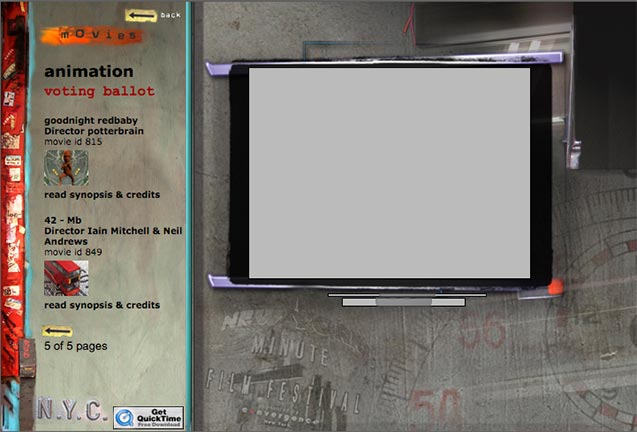
Do You Remember These Submissions?
October 23, 2005
goodnight redbaby
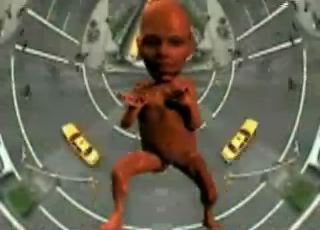
Director: potterbrain
Music Production, Editing and Computer Graphics by potterbrain
Enjoy the Movies!!
Posted by jeff at November 5, 2005 05:24 PM
Comments: from one director in this comp. to another, nice work
Posted by: Luis Rafael Prada at November 18, 2005 03:46 PM
October 23, 2005
Thank God For The Mac

Director: Darrell Smith
After being turned down all day trying to find a job and talking to a pretty girl Steve finally finds comfort in his Big Mac.
Enjoy the Movies!!
October 23, 2005
Sursum 1892-1902
Director: Rodger Marion
A poetic look at the unconventional life of the nineteenth-century German-American sculptor Elisabet Ney.
Written, produced, and directed by Rodger Marion.
Narrator – Dianne Marion.
Enjoy the Movies!!
Posted by jeff at October 23, 2005 10:58 AM
October 23, 2005
How are you[GI Joe]?
Director: strach
Music & video: eveningsandweekends
Director: Strach
Holiday images courtesy Matt Smith
October 15, 2005
Crime On A String
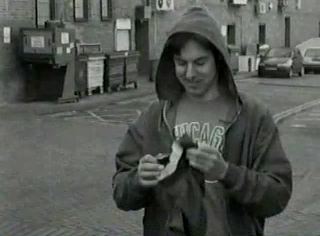
Director: Nick Karner
A thief gets more than he expected from a hapless victim's pants!
CAST:
Rudi Fieldgrass: Victim
Nick Karner: Thief
Dir./Prod./Writer/Ed.: Nick Karner.
Dir. of Phot.: Puneet Mehra.
Asst. Dir.: Beata Chelkowska.
Produced and Distributed by Insane Asylum Features.
October 15, 2005
Shitty Chicken
Director: Nick Karner
A homeless man discovers he has a rare gift!
CAST: Nick Karner as the Bum.
Dir./Prod./Writer/Ed.: Nick Karner.
Dir. of Photography: Puneet Mehra.
Asst. Dir. Beata Chelkowska.
Music by Gareth "Nang" Parkinson.
Produced and Distributed by Insane Asylum Features.

October 15, 2005
School Days
Director: Jason Santelli
I was thinking about my old school days and it hit me, so I made a video interpretation.
You all will remember these days....I think!
A film by: Christian A. Kocinski
Experimental music video combining live action with pixelation, a stop motion animation technique.
Incoherent Astronomy took 1 day to shoot, and up to 24 combined hours of editing.
Music provided by Nemo
October 8, 2005
session of the christ
Directors: Jean-Claude Campell & Marco Bowald
HALLELUJA !!
October 8, 2005
Black Eye

Directors: Andrew Robb & Martin Briggs-Watson
When you want a little relief in your life, sometimes you just need the right sign.
Man: Andrew William Robb
Camera: Zuleika Kingdon
Edited by: Martin Briggs-Watson
Produced by: Algernon Productions and Distant Objects
Format: DV, 4:3
October 01, 2005
Scudder Park Northport: New York

Director: Jackson Smith
October 01, 2005
HIRUG
Director: Ric Govea
Credits:
Writer,Edited,Produced & Directed by Ric Govea.
Starring:Paulina Govea and Tom Anderson.
October 01, 2005
A Glove's Day
Director: Sandra Mareska Baid
This film is made up of a series of photographs of gloves put together to make up the story of A Glove’s Day. The film begins with a photograph of a Glove driving to work at 8: 30am and ends with a photograph of sleeping gloves.
Credits Special Thanks to Robert Jones Mathew Beale Dmitri Oster Alan Waters
October 01, 2005
The Ball
Director: Dave Siriano
This short film is an infomercial of a great new product. Look for it soon!
Thanks to my family and friends who helped me and our church, Faith Temple.
Written and Directed by: Dave and Glenda Siriano
October 01, 2005
The Thong

The real thong!
October 01, 2005
Surprise
Director: Dave Siriano
This is the story of an office romance. Everyone loves a surprise!
Starring:
Steven Santana
Mariely Santana
Moises Aguayo
October 01, 2005
Wish Man
Director: Barry Littlefield
This is a film about a man who looks back at his life and wishes he could have made better choices.
August 13, 2005
noir
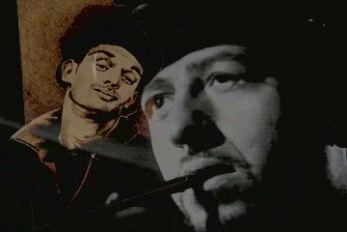
Director: gary epting
just another little taste of urban anxiety.
August 07, 2005
Lost In Albany NY
Director Roy Buckley
A minute worth of media from a whole year of shooting and interviewing in and around Albany NY.
More Background on The New York Minute Film Festival
The New York Minute Film Festival (NYMFF) is a distinctive entry in the world of film festivals, remembered for its innovative embrace of ultra-short storytelling and its pioneering use of the internet as a platform for both filmmakers and audiences. While the festival itself was short-lived, its influence and the conversations it sparked about the future of filmmaking continue to resonate. This article explores the NYMFF’s history, structure, reception, and cultural significance, drawing exclusively from sources beyond its official website and direct festival materials.
History and Founding Context
The NYMFF was launched in the mid-2000s, a time when digital video technology and broadband internet were rapidly democratizing the tools of filmmaking. The festival’s central premise was simple but radical: all films had to be exactly 60 seconds long. This constraint forced filmmakers to distill their ideas to their purest essence, encouraging creativity and innovation within a tightly defined format.
The festival’s online submission process was ahead of its time. While many established festivals still relied on physical media and in-person screenings, NYMFF leveraged the web to open its doors to a global pool of talent. This digital-first approach allowed filmmakers from around the world to participate, regardless of their geographic location or resources.
Festival Structure and Unique Format
Submission Guidelines and Categories
-
Length: All films were required to be exactly one minute.
-
Categories: The festival accepted entries in a variety of genres, including drama, comedy, experimental, animation, and music video.
-
Accessibility: Open to both established and emerging filmmakers, the festival encouraged broad participation and multiple submissions.
Judging and Awards
-
Panel of Judges: NYMFF assembled a panel of industry professionals and, in some years, included celebrity judges. This lent credibility and visibility to the event.
-
Audience Involvement: Online viewing and voting allowed the public to help determine finalists, further democratizing the selection process.
-
Prizes: Winners received cash prizes, filmmaking gear, and recognition at a celebratory screening in New York City.
Critical Reception and Reviews
While the NYMFF did not achieve the mainstream visibility of larger festivals, it was covered in various film and tech publications for its innovative format. Industry observers praised the festival for:
-
Encouraging Concise Storytelling: The one-minute limit was seen as both a challenge and a creative opportunity, pushing filmmakers to focus on clarity, impact, and originality.
-
Democratizing Access: By moving submissions and voting online, the festival lowered traditional barriers to entry and broadened its reach.
-
Spotlighting Emerging Talent: The festival became a platform for new voices, some of whom went on to pursue further opportunities in film and media.
For example, the New York Times and IndieWire referenced the festival in articles about the rise of micro-filmmaking and the growing trend of online festivals. Commentators noted that the NYMFF anticipated the popularity of platforms like Vine and TikTok, which would later make short-form video a mainstream phenomenon.
Press and Media Coverage
The NYMFF received attention from both local and national media, especially in the context of the burgeoning online film festival scene. Outlets such as Filmmaker Magazine and MovieMaker highlighted the festival’s innovative approach, noting its role in:
-
Fostering Community: Through online forums and social media, the festival built a supportive network of filmmakers and fans.
-
Showcasing Diversity: The global reach of the festival led to a diverse array of submissions, reflecting a wide range of cultural backgrounds and storytelling styles.
Some articles also discussed the festival’s partnerships with sponsors and media companies, which helped provide prizes and additional exposure for winners.
Audience and Community
The NYMFF attracted a broad audience, including:
-
Aspiring Filmmakers: Drawn by the low barrier to entry and the creative challenge of the one-minute format.
-
Industry Professionals: Interested in discovering new talent and observing trends in digital storytelling.
-
General Public: Engaged through online voting and viewing, making the festival a participatory event.
Online forums and blogs from the mid-2000s feature discussions among participants, sharing tips on crafting effective one-minute films and recounting their experiences with the festival. Some filmmakers have cited the NYMFF as a formative experience in their careers, highlighting the value of its feedback and exposure.
Notable Submissions and Winners
While comprehensive lists of winners are difficult to find outside the festival’s own archives, several films and filmmakers gained recognition through the NYMFF. Examples include:
-
Experimental Shorts: Many submissions used the time constraint to experiment with visual storytelling, animation, or rapid-fire editing.
-
Comedic Entries: The brevity of the format lent itself well to punchy, comedic sketches that could deliver a setup and punchline in seconds.
-
Personal Stories: Some filmmakers used their minute to craft poignant, autobiographical vignettes.
These films were often shared on early video platforms and discussed in online communities, helping to spread the festival’s influence beyond its immediate participants.
Cultural and Social Significance
The NYMFF holds a special place in the evolution of digital filmmaking. Its most significant contributions include:
-
Anticipating Short-Form Video Trends: The festival’s focus on one-minute films foreshadowed the later success of platforms like Vine, Instagram, and TikTok, where brevity and creativity are prized.
-
Democratizing Film Festivals: By embracing online submissions and voting, the NYMFF helped pave the way for a new generation of digital festivals that prioritize accessibility and global participation.
-
Championing New Voices: The festival’s open format and low entry fee encouraged participation from a wide range of filmmakers, including those from underrepresented backgrounds.
Film historians and critics have pointed to the NYMFF as an example of how technological change can disrupt traditional models and foster innovation in the arts.
Challenges and Limitations
Despite its successes, the NYMFF faced several challenges:
-
Sustainability: Like many early online festivals, the NYMFF struggled to maintain momentum and funding over the long term. Its brief run reflects the difficulties of sustaining such ventures without significant institutional support.
-
Visibility: While praised in niche circles, the festival did not achieve widespread mainstream recognition, limiting its impact relative to larger, more established events.
Nonetheless, the festival’s influence can be seen in the proliferation of micro-film competitions and the ongoing popularity of short-form video content.
Legacy and Continuing Influence
Although the NYMFF is no longer active, its legacy endures in several ways:
-
Inspiration for Other Festivals: The success and creativity of the NYMFF inspired similar competitions, both online and offline, that continue to explore the possibilities of ultra-short filmmaking.
-
Alumni Success Stories: Some participants have gone on to further achievements in film and media, citing the festival as a key stepping stone.
-
Ongoing Conversations: The festival is frequently referenced in discussions about the evolution of digital storytelling and the future of film festivals.
Film educators and industry professionals continue to use the NYMFF as a case study in the power of constraints to drive innovation and the importance of accessibility in the arts.
The New York Minute Film Festival occupies a unique niche in the history of film festivals. Its embrace of one-minute films, digital submissions, and online voting marked it as a pioneer in the democratization of filmmaking. While its run was brief, its influence on short-form storytelling and online festival culture remains significant.
Today, as short videos dominate social media and filmmakers around the world experiment with new forms and formats, the NYMFF’s legacy is more relevant than ever. It stands as a testament to the enduring appeal of concise, creative storytelling and the transformative power of technology in the arts.
